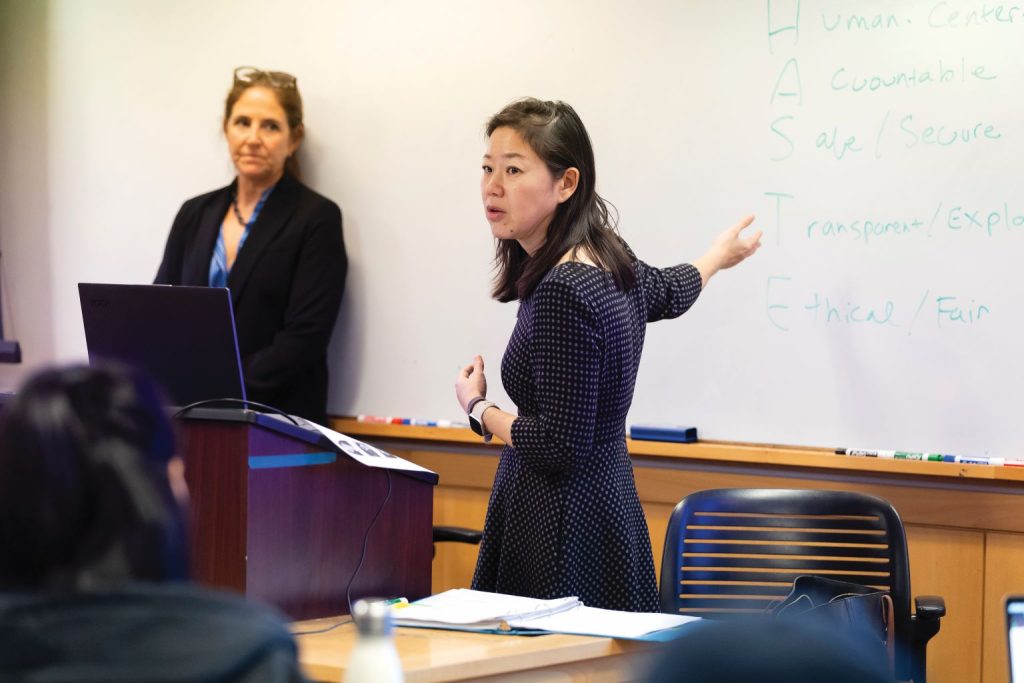Artificial intelligence can help prepare you for the legal world, starting with your law school application.
Sandra Day O’Connor College of Law at Arizona State University made news last year when it allowed students to use generative artificial intelligence tools in the admissions process.
ASU Law, which has long been a school that strives to be at the cutting edge of technology, is viewing generative AI as a valuable tool and has launched a new AI focus area across several degree programs.
With the decision to lean into this new technology, the school has added classes designed to ensure that students understand how generative AI works, its advantages and its pitfalls.
And ASU Law is not alone.
Other schools are rising to the challenges of generative AI and addressing the issue head on, while also trying to stay nimble and adapt to new developments.
This is documented in the American Bar Association’s AI and Legal Education Survey, which was released in June.
The survey of 29 law schools shows that most are integrating AI into their course of studies while continuing to work out the finer points of their policies on its use.
At 55% of the schools surveyed, classes are offered on learning about AI and how to use it. Meanwhile, 83% offer related curricular opportunities such as clinics, and 69% have adapted their academic integrity policies to account for AI use.
The survey showed that 62% have not decided how to address the issue of using generative AI in the admissions process.
Stacey Leeds, dean of ASU Law, said the school initially received pushback from the legal community about allowing generative AI to be used in admissions, but once school officials explained their rationale, the objections subsided.
“From an access standpoint, if someone has financial resources to go out and hire a consultant to help them put their application package together, which would mean looking at their resume and essays and suggesting how they could write things differently, using generative AI would not be any different,” Leeds said. “Someone could go online and use a prompt just like they would use a Google search to come up with examples of other people’s essays and then get a sense of how to present the arguments.”
In addition to individual classes about generative AI, the school will now offer an emphasis in AI across its M.L.S., LL.M. and J.D. programs. Courses dealing with the use of AI in legal practice and related privacy and legal issues are designed to help ensure that students become proficient in using the technology as well as managing it when it’s encountered in legal practice.
“It’s not just that you need to be aware of it,” Leeds said. “You can have a competitive advantage in the market if you know how to deploy it for your legal research and otherwise.
“These students who come out with not just an awareness of what it is, but some skill sets about how to move the technology forward, are going to be highly sought after no matter what kind of law they practice.”

University of California, Berkeley, School of Law is also adding AI-focused classes. The school recently announced a new LL.M. program with a specialization in artificial intelligence. It is being treated as a pilot program where they can try out new ideas before propagating them into other parts of the law curriculum.
The LL.M. program is a year-long, parttime course with a strong overlap between AI and intellectual property, antitrust and consumer protection.
Adam Sterling, assistant dean at Berkeley Law, said the course is designed for attorneys, foreign and domestic, who want to do a deep dive into AI and the regulation.
“We are making a big investment because we think that this can change not just how people practice but also the sorts of technologies and the clients that they counsel,” Sterling said.
The school has established an advisory council of industry leaders to help develop the curriculum. It includes members from Meta, Allen Institute for AI, Infoblox, Anthropic, the ACLU of Northern California, Responsible Innovation Labs and more.
Sterling said the school will continue to work with the group and update their electives to keep pace with advancements in technology.
Berkeley Law also has announced a new faculty position. Part of the position’s description says it will seek “to address questions related to the myriad ways in which AI may reshape society and individual lives, possibly exacerbating existing inequalities and creating new ones while changing opportunity structures and participation by individuals and groups in society.”
The school is striving to be a leader in this area, committed to teaching students about technology and how they can use it both in everyday life and in their profession.
Sterling said the advent of AI is similar to the rise of the internet. At first, it was a new, unproven technology, but eventually most everyone grew to accept and ultimately rely upon it.
“We don’t necessarily want to prevent [AI] use,” he said. “We want to understand it, make sure it’s not impacting how we teach, how our students learn; but we are thoughtful about incorporating it into our curriculum. For better or worse, I think folks will utilize this as a tool in their work, and so understanding the benefits, the risks of doing that, we just want to be on top. We want to be a leader and not someone that’s resistant or just following others.”
Renee Henson, professor at University of Missouri School of Law, said she’s optimistic about the efficiency and ease of AI and what that means for the law profession.
In Henson’s course, Lawyering: Problem Solving and Dispute Resolution, she trained a chatbot to act as opposing counsel in a mock negotiation. She coached the bot to be difficult. This presented the opportunity for her students to perform a live negotiation with the chatbot with the goal of reaching an agreement on obtaining documents.
“It was an interesting experience where students had to think on their feet in real time,” Henson said. “The simulation was not dissimilar from how a real-life opposing counsel would operate.”
Law schools are taking diverse approaches to AI, which is not only a reflection of how fraught a lot of the landscape around AI is but also an indicator of how prepared (or not) various schools are for it.
The challenge is to find a balance between innovation and integrity. While many schools are keen to embrace AI as an exciting new field of technology, many are just as worried about the implications of plagiarism, given that text generators such as ChatGPT and image generators such as Midjourney base their output on publicly available material without noting its place of origin.
One part of the ABA survey asked if schools had updated their academic integrity policies. The resulting report said some schools “have clarified within their academic integrity policies that work produced by AI is considered the work of another, aligning the use of generative AI with existing definitions of plagiarism.”
Both ASU’s Leeds and Berkeley’s Sterling are optimistic about the future of AI as well, saying that it will only grow from here and that their schools are proud to be at the forefront of the technology.
“I don’t think this will replace lawyers,” Sterling said. “I think it should be a great tool for lawyers. I think this is something that can make them more efficient.”
This article appeared in the 2025 Winter issue of preLaw magazine.

